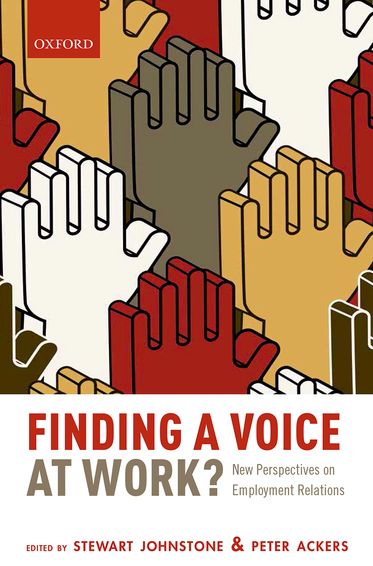Finding a Voice at Work?

Finding a Voice at Work?
|
ISBN: |
9780199668007 |
|
Binding: |
Hardback |
|
Published: |
11 Mar 2015 |
|
Availability: |
|
|
Series: |
$234.95 AUD
$269.99 NZD
Request an inspection copyDescription
Voice can also mean different things to different people. For some, employee voice is a synonym for trade union representation which aims to defend and promote the collective interests of workers. For others voice, is means of enhancing employee commitment and organisational performance. Others advocate workers control as an alternative to conventional capitalist organisations which are run for shareholders. There is thus both a moral and political argument for a measure of democracy at work, as well as a business case argument, which views voice as a potential link in the quest for increased organisational performance.
The key debate for employment relations is which of the approaches 'works best' in delivering outcomes which balance competitiveness and productivity, on the one hand, and fair treatment of workers and social justice on the other. Policy makers need pragmatic answers to enduring questions: what works best in different contexts, what are the conditions of success, and what are the drawbacks?
Some of the most significant developments in employee voice have taken place within the European Union, with various public policy and employer experiments attracting extensive academic research. The book offers a critical assessment of the main contemporary concepts and models of voice in the UK and Europe, and provides an in-depth theoretical and empirical exploration of employee voice in one accessible and cohesive collection.
Contents
1: Stewart Johnstone & Peter Ackers: Introduction: Employee Voice: The Key Question for Contemporary Employment Relations
PART ONE: KEY CONCEPTS
2: Edmund Heery: Frames of Reference & Worker Participation
3: David Guest: Voice and Employee Engagement
4: Anne-marie Greene: Voice and Workforce Diversity
PART TWO: UNION VOICE - COMPETING STRATEGIES
5: Peter Ackers: Trade Unions as Professional Associations
6: Melanie Simms: Union Organizing as an Alternative to Partnership. Or What to do When Employers Can't Keep Their Side of the Bargain
7: Stewart Johnstone: The Case for Workplace Partnership
PART THREE: EUROPEAN MODELS & VARIETIES OF CAPITALISM
8: Peter Samuel and Nick Bacon: Social Partnership in Devolved Nations: Scotland and Wales
9: Michael Gold & Ingrid Artus: Employee Participation in Germany: Tensions and Challenges
10: Andrew R. Timming and Michael Whittall: The Promise of European Works Councils: Twenty Years of Statutory Employee Voice
11: Tony Dobbins and Tony Dundon: The EU Information and Consultation Directive in Liberal Market Economies
PART 4: LOOKING AHEAD
12: Richard Hyman: Making voice effective: imagining trade union responses to an era of post-industrial democracy
13: Bruce E. Kaufman: The Future of Employee Voice in the USA: Predictions from an Employment Relations Model of Voice
Authors
Edited by Stewart Johnstone , Senior Lecturer in HRM, Newcastle University Business School
Peter Ackers , Professor of Industrial Relations and Labour History, Loughborough University
Stewart Johnstone is Senior Lecturer in Human Resource Management at Newcastle University Business School and was previously Lecturer in Human Resource Management at Loughborough University. His specialist teaching includes Employment Relations and Human Resource Management courses at undergraduate, postgraduate, and executive levels. A major strand of Stewarts research has been the dynamics of employee voice and participation in both union and non-union firms. In particular, his research has examined organizational attempts to develop collaborative workplace relations in pursuit of mutual gains, and assessed the outcomes of such workplace partnerships for employers, employees, and unions. Peter Ackers is Professor of Industrial Relations and Labour History in the School of Business and Economics at Loughborough University, UK. He studied Politics and Philosophy (PPE, including Sociology) at Lincoln College, Oxford University, followed by an MA in Industrial Relations from Warwick University. His specialist teaching is in International Employment Relations, British Social History and Business Ethics. Peter's intellectual interests centre on the sociological and historical aspects of the employment relationship and how this affects ordinary people and society at large. His work stresses the moderate, constructive character of organized labour, with themes of partnership and pluralism, and challenges Radical and Marxist theories of Industrial Relations.